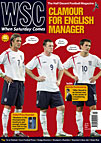 A new generation of football magazines has appeared in Europe of late, breaking the monopoly of established, establishment titles. The first of an occasional series looks at the subversion and humour attracting readers in Germany. Philipp Koster reports
A new generation of football magazines has appeared in Europe of late, breaking the monopoly of established, establishment titles. The first of an occasional series looks at the subversion and humour attracting readers in Germany. Philipp Koster reports
The magazine (literally 11 friends) began in April 2000 with a print run of 2,500. There was no marketing department or organised distribution, just two Arminia Bielefeld fans with the desire to produce magazines. Before that we’d had a small fanzine called Um halb vier war die Welt noch in Ordnung (At half three the world was still OK) – and noticed that supporters liked a certain type of writing: ironic and critical of the growing commercialisation of football. We naturally thought that these fans needed a national voice.
We have the perspective of terrace fans, which is the most important element of the 11 Freunde philosophy and what separates us from other German magazines that have appeared in recent years. There is Player, which concentrates on football fashion and lifestyle, and there’s Rund, which likes to take an intellectual view but excludes fans. But German football literature made major strides during the 1990s. Club fanzines such as Schalke’s Unser and St Pauli’s Millerntor Roar showed that there could be a humorous way of looking at football. Nick Hornby’s Fever Pitch was a huge success in Germany and prompted a wide range of good books covering various aspects of football culture, while at the same time the game was suddenly discovered by the magazine supplements of the major broadsheets.There is still a distinct shortage of decent books about coaches, managers and players, but we’re going in the right direction.
In general our readers are also contributors – our Auswartsspiel (away game) column is written exclusively by readers about the matches they’ve been to around the world during the preceding month. We’re not just a fans’ mouthpiece, broadcasting their unfiltered opinions – journalistic demands take precedence. But we don’t want to emulate the many German sports journalists, especially on TV, who treat players and managers as mates. It’s hard to keep a sense of distance if you’re going to the sauna and playing golf with the people you’re writing about. We are engaged with the main issues in traditional fan culture – in favour of terraces and freedom for supporters. The overriding issue that concerns German fans at the moment is police repression. In the run-up to the 2006 World Cup, the areas in and around stadiums have been harshly policed, with fans pestered and subject to restrictions. This has inevitably led to an opposite reaction, as supporters defend themselves.
As far as the football itself in concerned, things could be a lot better in the Bundesliga. Heribert Bruchhagen, the president of Eintracht Frankfurt, recently said that Bayern will win 16 out of the next 20 championships and I fear that he is right. It has already reached the point where only a couple of teams could be realistic challengers for the title – two-thirds of the league is just playing along. Sometimes we’re jealous of the English, Spanish or Italian leagues with their star names who we would also like to see in our stadiums on Saturdays. On the other hand, as a rule, stadiums in Germany tend to be full and clubs’ finances are mostly in a healthy state. No one wants to see the chaos of Italian football repeated here.
From WSC 229 March 2006. What was happening this month